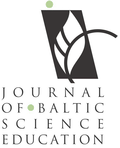DIRECT LEARNING ABOUT NATURE IN 6-YEAR-OLD CHILDREN LIVING IN URBAN AND RURAL ENVIRONMENTS AND THE LEVEL OF THEIR KNOWLEDGE AND SKILLS
| Title | DIRECT LEARNING ABOUT NATURE IN 6-YEAR-OLD CHILDREN LIVING IN URBAN AND RURAL ENVIRONMENTS AND THE LEVEL OF THEIR KNOWLEDGE AND SKILLS |
| Publication Type | Journal Article |
| Year of Publication | 2017 |
| Authors | Nazaruk, SK, Klim-Klimaszewska, A |
| Journal | Journal of Baltic Science Education |
| Volume | 16 |
| Issue | 4 |
| Start Page | 524-532 |
| Pagination | Continuous |
| Date Published | August/2017 |
| Type of Article | Original article |
| ISSN | 1648-3898 |
| Other Numbers | E-ISSN 2538-7138 |
| Keywords | children in 6-year-old, developing knowledge and skills, direct learning, urban and rural environments |
| Abstract | The contemporary theory of learning treats pre-school instruction as the first level of early child education. The pre-school age is seen as a very important period of life. A pre-school child grasps knowledge spontaneously, naturally, in all circumstances, thus, direct learning seems to be of particular importance. It may therefore seem that children living in the village have more stimuli for direct learning about nature, developing their knowledge and skills. However, children living in the city have more access to different amenities and financial resources to develop their talents and interests. The following studies have been conducted to determine whether there is a difference in the knowledge and skills about nature in 6-year-old children regarding the place of residence. The research covered 50 children in the city and 40 children in the village. The examination consisted of two stages: the pre-test and post-test. There were used age-appropriate flash cards. During 6 months, teachers systematically introduced a direct learning project on nature in four ecosystems: a meadow, a park, a forest, a zoo. The analysis of the data gathered in the research showed that direct cognition has an impact on increasing children's knowledge and skills. |
| URL | http://oaji.net/articles/2017/987-1503905027.pdf |
| DOI | 10.33225/jbse/17.16.524 |
| Refereed Designation | Refereed |
| Full Text |
